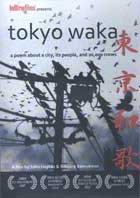
Tokyo Waka 2012
Distributed by Bullfrog Films, PO Box 149, Oley, PA 19547; 800-543-FROG (3764)
Produced by John Haptas and Kristine Samuelson
Directed by John Haptas and Kristine Samuelson
DVD, color, 53 and 63 min. versions
College - General Adult
Japan, Urban Studies, Crows, Bird Habitat, Human Ecology, Asian Studies, Animal Behavior & Communication, Buddhism, Wildlife Management, Culture & Nature
Date Entered: 05/14/2013
Reviewed by Hong Cheng, Instruction Librarian, LaGuardia Community College, City University of New York, Long Island City, NYCrows possess various spiritual meanings from the East to the West, from positive to negative. “Waka” means poems in Japanese, and the film Tokyo Waka is about a tale of Tokyo and the life of more than 20,000 crows in the city. The film illustrates a complicated relationship between people and crows and how human beings shrug at their bird friends and accept their existence as part of the concrete jungle.
Considered to be one of the smartest animals, crows in Tokyo adapted along with the development of the city over the course of its history. The film displays a vivid picture of their living habits: how they steal trash food, use hangers to build nests, and evade the government’s traps.
The film is more than a document of the life of crows. The directors use a number of historical pictures, videos and sound works. All illustrations are essentially important for educational purposes, since the audience will have additional information to understand the history. The sound designs especially stand out and flatter the Zen cinematography of the movie.
The DVD comes with 53 minutes and 63-minute versions. The difference is the long version contains interviews at the zoo, gardens, and with people like maids, café waitresses and a toy store owner. English and Japanese captions are both available along with scene selection.
Excellent in storytelling and Zen in cinematography and sound design, this film is highly recommended to researchers and students who are interested in exploring the relationship between nature, animals and human beings.
Awards
- 2012 Green Film Festival in Seoul Best Feature Film
- 2012 United Nations Association Film Festival Best Cinematography